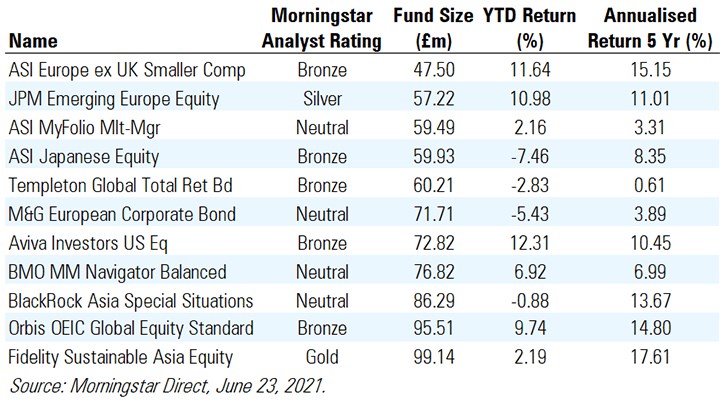
It is easy to fall into the trap of believing big funds perform better than small funds. A common assumption is that big portfolios investing in blue-chips are safer, cheaper and generally better. Meanwhile smaller funds are typically believed to carry more risk and higher fees. So we have dug out our favourite small funds to see how they have performed.
Does Size Matter For Funds?
The short answer: yes. The point of a fund is to invest in stocks with the potential to grow - when a fund's holdings grow, so too do its asset. And it matters when a fund becomes too small, as well as too big - a fund needs to reach a certain size to be economically viable to run.
But as a fund grows, its ability to react nimbly to market events lessens. So too does its capacity to invest in companies further down the market-cap spectrum, because any position would make it too large a shareholder in the business. This is a positive for smaller funds, where managers can invest in companies with a smaller market capitalisation.
To find out whether there is a small fund for you, we have looked at how funds rated by Morningstar analysts with less than £100 million of assets under management are doing.
UK Domiciled Funds with Assets Below £100 Million

There are 11 funds under £100 million with a Morningstar Analyst Rating, though four of these are rated Neutral.
So far this year, the Aviva US Equity fund has grown the most. The Bronze-rated fund has seen a total return of 12.31% this year, following a negative 2020 which saw it fall 3.4%. Morningstar analyst Kevin McDevitt likes the fund because while its income-oriented strategy is high risk, its experienced management knows how to balance that risk, making it a solid choice for conservative investors. In fact, by keeping volatility below the benchmark and sticking to dividend-paying stocks like UPS, Corning and Target, the equity fund has delivered annualised 5-year returns of 10.45%.
Long-Term Performance
Looking at the 5-year average returns of our small funds, the Fidelity Sustainable Asia Equity Fund (previously Fidelity Emerging Asia) has gained the most with an annualised return of 17.61%, helped by holdings in the likes of Taiwan Semiconductor, AIA Group and Samsung. The fund adopted a sustainability mandate in April, which means some stocks are now excluded, but the fund’s approach remains centred on economic moats, quality management and valuations – with financial services and technology accounting for over half of its portfolio. So far this year, the fund has only gained 2.19%, but by consistently outperforming its peers (and charging a relatively competitive 0.89%) is the only fund in our list to hold a coveted Gold Morningstar Analyst Rating.
Aberdeen Standard Investment manages three of the UK’s sub £100 million funds. Bronze-rated ASI Europe ex UK Smaller Companies is the smallest in the UK, and the only fund under £50 million. Despite this, it has managed to provide the second-best returns both year to date and over the past five years (11.64% and 15.15% respectively). The fund has applied a quant model to identify improving or deteriorating situations, which seems to have helped it outperform the benchmark. Some 38.23% of its portfolio is invested in industrials and Troax Group is its biggest holding.
On the other hand, the ASI Japanese Equity fund has had the worst performance so far this year, down 7.46% year to date, following two years of double-digit growth. Its five-year annualised return does however remain positive at 8.38% as the fund continues its strong focus on long-term quality companies like Sony, Asahi and Toyota.
And, at first glance JPM Emerging Europe Equity has remained the most stable fund in our cohort, with less divergence between the year-to-date (10.98%) and five-year annualised (11.1%) results than the bond and balanced funds. But, its performance has been a lot more volatile on a yearly basis, returning everything between -29.63% and 52.79% since 2014. The fund has a high exposure to energy and basic materials companies including PJSC Lukoil and Norilsk Nickel. According to Morningstar’s analyst Lena Tsymbaluk, the fund benefits from the lead manager’s experience in the region, extensive resources, and a two-step process to identify quality companies looking at return potential and growth prospects.




























